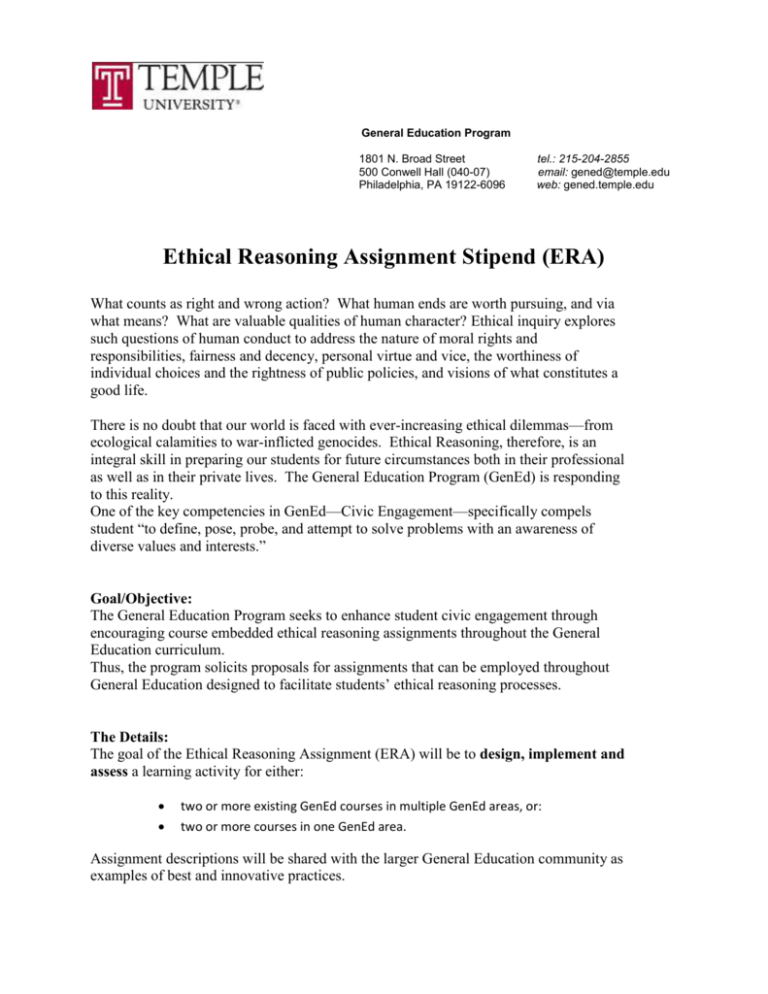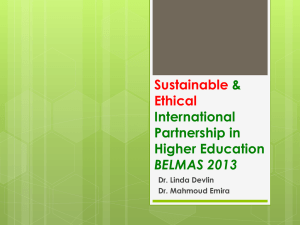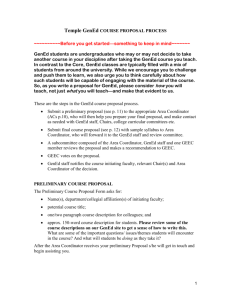Ethical-Reasoning-Assignment-Stipend-2016
advertisement

General Education Program 1801 N. Broad Street 500 Conwell Hall (040-07) Philadelphia, PA 19122-6096 tel.: 215-204-2855 email: gened@temple.edu web: gened.temple.edu Ethical Reasoning Assignment Stipend (ERA) What counts as right and wrong action? What human ends are worth pursuing, and via what means? What are valuable qualities of human character? Ethical inquiry explores such questions of human conduct to address the nature of moral rights and responsibilities, fairness and decency, personal virtue and vice, the worthiness of individual choices and the rightness of public policies, and visions of what constitutes a good life. There is no doubt that our world is faced with ever-increasing ethical dilemmas—from ecological calamities to war-inflicted genocides. Ethical Reasoning, therefore, is an integral skill in preparing our students for future circumstances both in their professional as well as in their private lives. The General Education Program (GenEd) is responding to this reality. One of the key competencies in GenEd—Civic Engagement—specifically compels student “to define, pose, probe, and attempt to solve problems with an awareness of diverse values and interests.” Goal/Objective: The General Education Program seeks to enhance student civic engagement through encouraging course embedded ethical reasoning assignments throughout the General Education curriculum. Thus, the program solicits proposals for assignments that can be employed throughout General Education designed to facilitate students’ ethical reasoning processes. The Details: The goal of the Ethical Reasoning Assignment (ERA) will be to design, implement and assess a learning activity for either: two or more existing GenEd courses in multiple GenEd areas, or: two or more courses in one GenEd area. Assignment descriptions will be shared with the larger General Education community as examples of best and innovative practices. Ethical Reasoning assignments, usually, include some type of writing focused on an ethical question or questions, or analyze a concrete case, policy, or dilemma using an ethical framework as they relate to contexts such as, society, science, technology, law, etc. These assignments should enable learners to integrate content and extend their investigations, become more self-directed, and assume greater control over their own learning and values. An ethical reasoning individual is able to: Discern the ethical issues at stake in individual and collective decisions Identify, understand, and use multiple normative concepts and arguments Evaluate competing ethical perspectives on human problems and action Articulate and critically evaluate distinct ethical perspectives on concrete dilemmas Define and probe ethical judgments about right and wrong action or policy in the face of competing ethical judgments Nota bene: While newly developed assignments are preferred, a proposal may expand on an already existing exercise currently used in a single course as long as the proposal explicitly describes how the assignment may be amended for use in other General Education courses. Submissions: Applicant must: actively teach at least one course in the General Education curriculum and be a full-time faculty member agree to provide student samples of assignment at end of semester In 750 words or less, please describe the proposed ERA activity on a separate sheet. In your description, please address how the assignment meets five (5) learning goals as outlined in the bulleted listed above; how the assignment is to be integrated into the courses and area(s), and finally how the new assignment will be assessed for its effectiveness, including its impact on the final course grade. Evaluation Criteria: A GenEd subcommittee will evaluate submissions to select the most promising assignments. Proposals will be evaluated on the project’s fit with the ethical reasoning learning goals, the assignment’s potential for implementation in a wide range of courses and/or GenEd areas and or innovative pedagogical practices. The Award/Requirements: General Education will fund up to ten (10) ERA stipends per academic year. If the committee approves your proposal, there is a $500 stipend for each assignment developed and successfully implemented and assessed. After the completion of the assignment during the spring term, a one-page final report with student examples must be submitted by the faculty instructor to the GenEd office. The report should summarize the successes/failures of the activity and possible suggestions for improvement. Deadline: The proposal submission deadline is: November 30, 2015 . . The stipend will be dispersed once the final report is received in the GenEd office. Please complete the information on the coversheet and attach it to the proposal. For more information, please contact Istvan Varkonyi: samsa@temple.edu COVER SHEET for Ethical Reasoning Assignment (ERA) Stipend Please attach to your proposal submission. Deliver to: General Education Program Office 500 Conwell Hall Instructor’s Name_________________________ Email_____________________ GenEd Course (s) you are scheduled to teach in the current academic year:______________________________________________________________ Department____________________________ Date___________________ GenEd Course Titles/Numbers and Area(s) for the ERA Stipend: __________________________________________________________________









